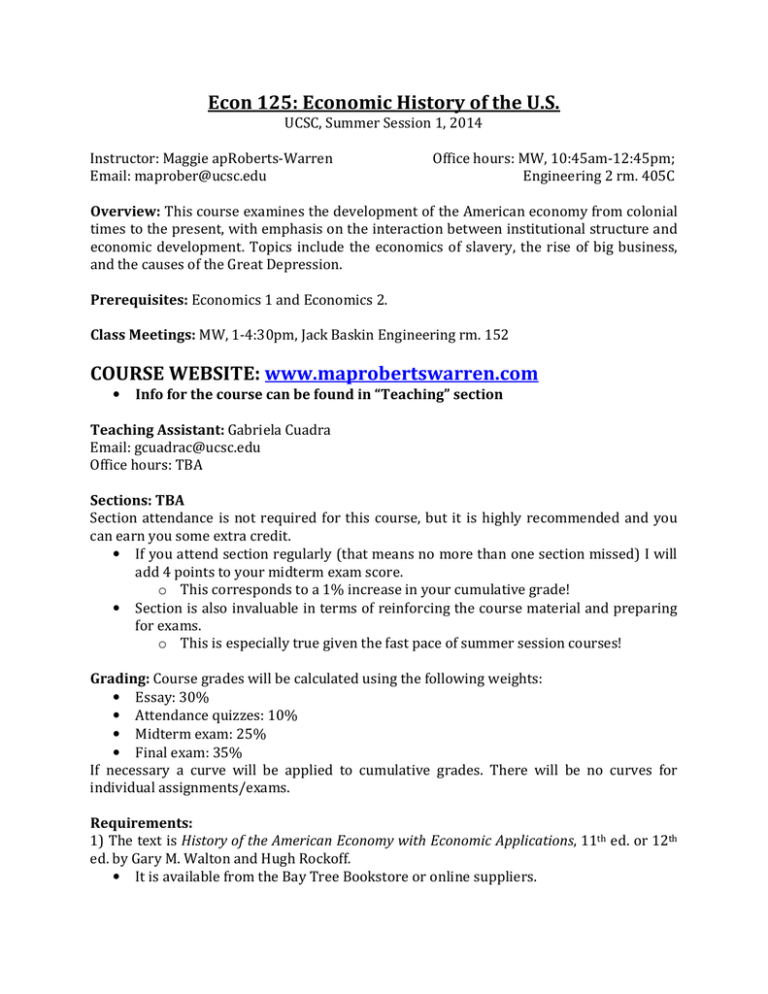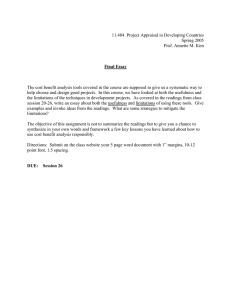Econ 125: Economic History of the U.S. COURSE WEBSITE: www
advertisement

Econ 125: Economic History of the U.S. UCSC, Summer Session 1, 2014 Instructor: Maggie apRoberts-Warren Email: maprober@ucsc.edu Office hours: MW, 10:45am-12:45pm; Engineering 2 rm. 405C Overview: This course examines the development of the American economy from colonial times to the present, with emphasis on the interaction between institutional structure and economic development. Topics include the economics of slavery, the rise of big business, and the causes of the Great Depression. Prerequisites: Economics 1 and Economics 2. Class Meetings: MW, 1-4:30pm, Jack Baskin Engineering rm. 152 COURSE WEBSITE: www.maprobertswarren.com • Info for the course can be found in “Teaching” section Teaching Assistant: Gabriela Cuadra Email: gcuadrac@ucsc.edu Office hours: TBA Sections: TBA Section attendance is not required for this course, but it is highly recommended and you can earn you some extra credit. • If you attend section regularly (that means no more than one section missed) I will add 4 points to your midterm exam score. o This corresponds to a 1% increase in your cumulative grade! • Section is also invaluable in terms of reinforcing the course material and preparing for exams. o This is especially true given the fast pace of summer session courses! Grading: Course grades will be calculated using the following weights: • Essay: 30% • Attendance quizzes: 10% • Midterm exam: 25% • Final exam: 35% If necessary a curve will be applied to cumulative grades. There will be no curves for individual assignments/exams. Requirements: 1) The text is History of the American Economy with Economic Applications, 11th ed. or 12th ed. by Gary M. Walton and Hugh Rockoff. • It is available from the Bay Tree Bookstore or online suppliers. • Used 10th edition textbooks are fine, but editions earlier then the 10th will be out of date. 2) Exams – Both the midterm exam (25% of your grade) and final exam (35%) will be held during the normally schedule lecture time. • Midterm Exam Date: 7/7 • Final Exam Date: 7/23 o There are no makeup exams for either exam, no exceptions! The exams have two components: • Multiple choice questions • Short answer questions o Both types of questions will be posted in advance on the course website. o Only a subset of the posted questions will appear on the exams. You are welcome to prepare for the exam in groups, but each student must write their own individual exam. • You will need to bring a blue book and photo id to each exam. • Any student found with notes of any kind during the exam will fail the course and charges will be pursued with his/her college. 3) The Essay Requirement – The essay is worth 30% of the cumulative grade (5% for outline and 25% for the final draft). In it students must write a short, typed, double-spaced essay based on select readings from the economic history literature. The topics, with readings, are posted on the course website. Requirements: • Topic must be chosen from the provided list. • You must make use of all of the assigned readings for your topic. • Essay must be no longer than 2 pages, double-spaced, 1-inch margins, 12 point font. Things to keep in mind: • Your clarity, and proper use of the English language, counts. • You need to cite your sources properly. o The format for citing sources is posted on the course website, under the link “Reference format”. o Failure to cite your sources properly will result in substantial penalties. • You must turn in an essay to pass the course. • Late essays will not be accepted, except under extreme circumstances. You must submit an outline of your essay • Worth 5% of cumulative grade. • Required assignment. o If you do not turn in an outline, your final essay score will be reduced by 50%. • Must be in a specific format. o See the example outline posted on the course website for format details. Dates: Outline: 7/9 (required) Final draft: 7/23 (day of final) 4) Quizzes/Attendance – We will have an attendance quiz at a randomly chosen time every lecture. Each quiz will consist of one question on reading/material that we will be covering that day. • Students will receive one point for being present and one point for correct answer to quiz question. • Worth 10% of your cumulative grade. • No makeups, no exceptions. 5) Cheating/plagiarism - I take the issue of cheating very seriously and adhere to University guidelines regarding the consequences of cheating and plagiarism. If you are concerned about instances of cheating that are not noticed by me or the TA, please bring them to our attention so that we can be more vigilant. All students must bring identification with picture to every examination. These will be checked. Miscellaneous: If you qualify for classroom accommodations because of a disability, please get an Accommodation Authorization from the Disability Resource Center (DRC) and submit it to me in person outside of class (e.g., office hours) as soon as possible. Contact the DRC at 459-2089 (voice), 459-4806 (TTY), or http://drc.ucsc.edu for more information on the requirements and/or process. Course Schedule Readings marked with an *asterisk* are optional readings. All other readings are required. Week 1 (6/23-6/27) • Monday, 6/23: Colonial America and the American Revolution Readings: W&R: chs. 2, 3, 6, ch. 4 first 4 pages (pgs. 58-61 in 11th ed.), ch. 7 first 6 pages ( pgs. 110-115 in 11th ed). *Bernard Elbaum, “Why Apprenticeship Persisted in Britain But Not in the United States.” Journal of Economic History, June, 1989, pp. 337-349 • Wednesday, 6/25: Industry and Economy 1760-1860 Readings: W&R, chs. 7, 9, 10, 11 *Nathan Rosenberg, “Technological Interdependence in the American Economy.” From Inside the Black Box, Cambridge University Press, 1982, pp. 55-59. Week 2 (6/30-7/4) • Monday, 6/30: Money and Banking in the 19th and Early 20th Century Readings: W&R, chs. 12, 19 • Wednesday, 7/2: The Slave Economy and Causes of the American Civil War Readings: W&R, chs. 13-14 Week 3 (7/7-7/11) • Monday, 7/7: Midterm Exam; Slavery, the American Civil War and Post-Bellum Regional Divergence Readings: W&R, ch 14 • Wednesday, 7/9: The Rise of Big Business, Organized Labor and Regulation Readings: W&R, chs. 17-18, 20 Essay outlines due! Week 4 (7/14-7/18) • Monday, 7/14: The Great Depression and the New Deal Readings: W&R, chs. 22-24 *Eugene White, "The Stock Market Boom and Crash of 1929 Revisited." in Journal of Economic Perspectives, v. 4, no. 2, Spring 1990, pp. 67-83 • Wednesday, 7/16: Post-WWII Business Cycles in the US Readings: W&R ch. 27 Week 5 (7/21-7/25) • Monday, 7/21: The Economic Crisis of 2008 Readings: Benjamin Friedman. “Two Roads to Our Financial Catastrophe.” New York Review of Books, April 19, 2010. -Robert Solow, "A Failure of Capitalism." New York Review of Books, May 14, 2009. -Simon Johnson, "The Quiet Coup." Atlantic, May 2009. -Joseph Stiglitiz. “Capitalist Fools." Vanity Fair, Jan. 2009. -Alexander Field, “The Great Depression, the New Deal, and the Current Crisis." Challenge, July-August, 2009. -Michael Lewis. “Betting on the Blind Side.” Vanity Fair, April 2010. Excerpted from book by Michael Lewis, The Big Short, 2010. -*Alan Greenspan. “The Crisis.” Brookings Papers on Economic Activity, April 2010. -*Arvind Krishnamurthy. “How Debt Markets Have Malfunctioned in the Crisis.” Journal of Economic Perspectives, Winter 2010. • Wednesday 7/23: Final Exam, 1-4:30pm, Jack Baskin Engineering rm. 152 Final essays due!



